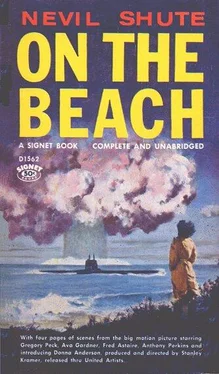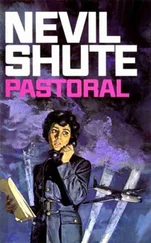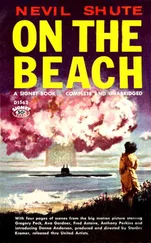Peter said in a low tone. "Do you suppose that’s what’s happened to the secretary?"
"I’d think so."
They stood in silence for a minute or two, staring out of the window. "Victualling," Peter said at last. "There’s nothing much in Scorpion. Is the exec getting out a list of what you’ll need, sir?"
Dwight shook his head. "We shan’t need anything," he said. "I’m only taking her down the bay and just outside the territorial limit."
The liaison officer asked the question that he had wanted to ask before. "Shall I lay on a tug to sail with you and bring the crew back?"
Dwight said, "That won’t be necessary."
They stood in silence for another ten minutes. Finally the admiral reappeared, grey faced. "Very good of you to wait," he said. "I’ve been a bit unwell..." He did not resume his seat, but remained standing by the desk. "This is the end of a long association, Captain," he said. "We British have always enjoyed working with Americans, especially upon the sea. We’ve had cause to be grateful to you very many times, and in return I think we’ve taught you something out of our experience. This is the end of it." He stood in thought for a minute, and then he held out his hand, smiling. "All I can do now is to say good-bye."
Dwight took his hand. "It certainly has been good, working under you, sir," he said. "I’m speaking for the whole ship’s company when I say that, as well as for myself."
They left the office and walked down through the desolate, empty building to the courtyard. Peter said, "Well, what happens now, sir? Would you like me to come down to the dockyard?"
The captain shook his head. "I’d say that you can consider yourself to be relieved of duty," he said. "I won’t need you any more down there."
"If there’s anything that I can do, I’ll come very gladly."
"No. If I should find I need anything from you, I’ll ring your home. But that’s where your place is now, fella."
This, then, was the end of their fellowship. "When will you be sailing?" Peter asked.
"I wouldn’t know exactly," the American said. "I’ve got seven cases in the crew, as of this morning. I guess we’ll stick around a day or two, and sail maybe on Saturday."
"Are many going with you?"
"Ten. Eleven, with myself."
Peter glanced at him. "Are you all right, so far?" Dwight smiled. "I thought I was, but now I don’t just know. I won’t be taking any lunch today." He paused. "How are you feeling?"
"I’m all right. So is Mary—I think."
Dwight turned towards the cars. "You get back to her, right now. There’s nothing now for you to stay here for."
"Will I see you again, sir?"
"I don’t think you will," said the captain. "I’m going home now, home to Mystic in Connecticut, and glad to go."
There was nothing more for them to say or do. They shook hands, got into their cars, and drove off on their separate ways.
In the old-fashioned, two-storey brick house in Malvein, John Osborne stood by his mother’s bed. He was not unwell, but the old lady had fallen sick upon the Sunday morning, the day after he had won the Grand Prix. He had managed to get a doctor for her on Monday but there was nothing he could do, and he had not come again. The daily maid had not turned up, and the scientist was now doing everything for his sick mother.
She opened her eyes for the first time in a quarter of an hour. "John," she said. "This is what they said would happen, isn’t it?"
"I think so, Mum," he said gently. "It’s going to happen to me, too."
Did Dr. Hamilton say that was what it was? I can’t remember."
"That’s what he told me, Mum. I don’t think he’ll be coming here again. He said he was getting it himself."
There was a long silence. "How long will it take me to die John?"
"I don’t know," he said. "It might be a week."
"How absurd," said the old lady. "Much too long."
She closed her eyes again. He took a basin to the bathroom, washed it out, and brought it back into the bedroom. She opened her eyes again. "Where is Ming?" she asked.
"I put him out in the garden," he said. "He seemed to want to go."
"I am so terribly sorry about him," she muttered. "He’ll be so dreadfully lonely, without any of us here."
"He’ll be all right, Mum," her son said, though without much confidence. "There’ll be all the other dogs for him to play with."
She did not pursue the subject, but she said, "I’ll be quite all right now, dear. You go on and do whatever you have to do."
He hesitated. "I think I ought to look in at the office," he said. "I’ll be back before lunch. What would you like for lunch?"
She closed her eyes again. "Is there any milk?"
"There’s a pint in the frig," he said. "I’ll see if I can get some more. It’s not too easy, though. There wasn’t any yesterday."
"Ming ought to have a little," she said. "It’s so good for him. There should be three tins of rabbit in the larder. Open one of those for his dinner, and put the rest in the frig. He’s so fond of rabbit. Don’t bother about lunch for me till you come back. If I’m feeling like it I might have a cup of cornflour."
"Sure you’ll be all right if I go out?" he asked.
"Quite sure," she said. She held out her arms. "Give me a kiss before you go."
He kissed the limp old cheeks, and she lay back in bed, smiling at him.
He left the house and went down to the office. There was nobody there, but on his desk there was the daily report of radioactive infection. Attached to it was a note from his secretary. She said that she was feeling very unwell, and probably would not be coming to the office again. She thanked him for his kindness to her, congratulated him upon the motor race, and said how much she had enjoyed working for him.
He laid the note aside and took up the report. It said that in Melbourne about fifty per cent of the population appeared to be affected. Seven cases were reported from Hobart in Tasmania, and three from Christchurch in New Zealand. The report, probably the last that he would see, was much shorter than usual.
He walked through the empty offices, picking up a paper here and there and glancing at them. This phase of his life was coming to an end, with all the others. He did not stay very long, for the thought of his mother was heavy on him. He went out and made his way towards his home by one of the occasional, crowded trains still running in the streets. It had a driver, but no conductor; the days of paying fares were over. He spoke to the driver. The man said, "I’ll go on driving this here bloody tram till I get sick, cock. Then I’ll drive it to the Kew depot and go home. That’s where I live, see? I been driving trains for thirty-seven years, rain or shine, and I’m not stopping now."
In Malvern he got off the tram and commenced his search for milk. He found it to be hopeless; what there was had been reserved for babies by the dairy. He went home empty-handed to his mother.
He entered the house and released the Pekinese from the garden, thinking that his mother would like to see him. He went upstairs to her bedroom, the dog hopping up the stairs before him.
In the bedroom he found his mother lying on her back with her eyes closed, the bed very neat and tidy. He moved a little closer and touched her hand, but she was dead. On the table by her side was a glass of water, a pencilled note, and one of the little red cartons, open, with the empty vial beside it. He had not known that she had that.
He picked up the note. It read,
My dear son,
It’s quite absurd that I should spoil the last days of your life by hanging on to mine, since it is such a burden to me now. Don’t bother about my funeral. Just close the door and leave me in my own bed, in my own room, with my own things all around me. I shall be quite all right.
Читать дальше












